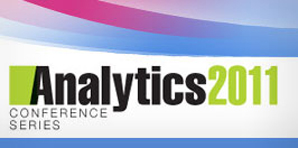 We'll interrupt the series on Why Forecasts are Wrong, with a report from the inaugural Analytics 2011 conference, held last week in Orlando.
We'll interrupt the series on Why Forecasts are Wrong, with a report from the inaugural Analytics 2011 conference, held last week in Orlando.
A2011 drew over 1025 attendees (from 44 states and over 25 counties). The Analytics conference series features a wide range of topics (including forecasting, optimization, data mining, text analytics, and high-performance analytics) and industries (such as manufacturing and consumer products, banking and financial services, insurance, utilities, and hospitality). I wanted to report on a few of the 50 sessions.
Tom Montgomery of Ford, on Prediction Markets
You can think of a "prediction market" as a virtual stock market to predict future events. Tom took us through the background theory behind PMs -- using the "wisdom of crowds" to aggregate the information held by many people to produce forecasts that are often better than experts, surveys, or analytical approaches. Many companies are now experimenting with this approach, and Tom shared some of the learnings from Ford Motor Company, where more than 1300 employee/traders have participated.
Prediction markets are not for large-scale forecasting problems, where you need forecasts for hundreds or thousands of items, and where good time-series forecasting software is available and appropriate. It would be unnecessary and impracticle to run a PM for every product in your portfolio. However, PMs can yield valuable results for new product sales, timing of projects or product releases, or feature/function/design questions.
In addition to the closing value of the questions that are posed for trading, Tom pointed out the value in the comments provided by traders. For example, an executive may push a favorite feature to be included in the next product release, but a prediction market can provide feedback on what a broader range of people really think about the feature. Preserving the anonymity of traders also allows them to voice their true opinion -- untainted by fear of reprisal. (Wouldn't you like a true estimate of when that project will finish, or when that new product will release?)
